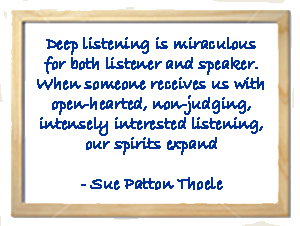- POPULAR ARTICLES
- Thank You Words
- Retirement Wishes
- Face to Face
Improving your listening skills
Listening skills are perhaps the most important communication skill one can acquire and master.
By becoming a good listener, you open the door to good communication.
Before we delve into the subject of becoming a better listener, let’s answer a question that is usually asked.
What is Listening
... and what's the difference between hearing and listening?
 To hear is to perceive with our ears the words that are being spoken. To listen is to pay attention with our other senses to help us understand the words being spoken.
To hear is to perceive with our ears the words that are being spoken. To listen is to pay attention with our other senses to help us understand the words being spoken.
We hear words with our auditory system and we listen to complete messages using our cognitive functions: attention, memory, thinking and reasoning.
To become a better listener, the first step is to know what barriers stand in our way.
Barriers to Effective Listening
The most common barriers to being a good listener are distractions, misinterpretations and attachment to our opinions.
Overcoming these barriers is straightforward and can be the biggest step in helping you communicate better with others in your life.
Skilled listeners are active listeners.
Active Listening
An active listener is a person engaged in what a speaker is saying. The active listener pays full attention to the words, and at times, the mood of the person speaking.
There are several degrees of active listening that range from merely repeating what the speaker said, to paraphrasing, to reflecting (mirroring what the speaker said using your own words).
Exercises for improving listening skills
By reading and understanding the various levels you can listen at, and by practicing the recommended exercises, your can become a skilled listener and a skilled communicator.For additional practice, do these active listening activities
A person that knows how to listen is someone who enjoys the fruits of meaningful and close relationships with others.
When you truly and actively listen to someone, you give that person a precious and sought after gift: attention.
In turn, the speaker is more inclined to reciprocate with the gift of his attention.

Go back to Home Page: People-Communicating




